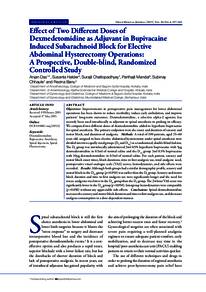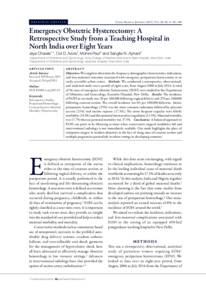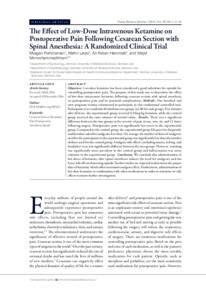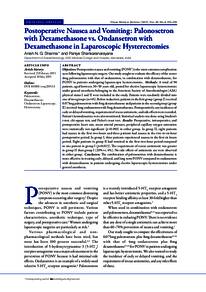Document
Effect of two different doses of dexmedetomidine as adjuvant in bupivacaine induced subarachnoid block for elective abdominal hysterectomy operations : a prospective, double-blind, randomized controlled study.
Identifier
DOI 10.5001/omj.2015.52
Contributors
Halder, Susanta., Author
Chattopadhyay, Surajit., Author
Mandal, Parthajit., Author
Chhaule, Subinay., Author
Publisher
Oman Medical Specialty Board.
Gregorian
2015-07
Language
English
English abstract
Objectives: Improvements in perioperative pain management for lower abdominal operations has been shown to reduce morbidity, induce early ambulation, and improve patients' long-term outcomes. Dexmedetomidine, a selective alpha-2 agonist, has recently been used intrathecally as adjuvant to spinal anesthesia to prolong its efficacy. We compared two different doses of dexmedetomidine added to hyperbaric bupivacaine for spinal anesthesia. The primary endpoints were the onset and duration of sensory and motor block, and duration of analgesia. Methods: A total of 100 patients, aged 35–60 years old, assigned to have elective abdominal hysterectomy under spinal anesthesia were divided into two equally sized groups (D5 and D10) in a randomized, double-blind fashion. The D5 group was intrathecally administered 3ml 0.5% hyperbaric bupivacaine with 5µg dexmedetomidine in 0.5ml of normal saline and the D10 group 3ml 0.5% bupivacaine with 10µg dexmedetomidine in 0.5ml of normal saline. For each patient, sensory and motor block onset times, block durations, time to first analgesic use, total analgesic need, postoperative visual analogue scale (VAS) scores, hemodynamics, and side effects were recorded. Results: Although both groups had a similar demographic profile, sensory and motor block in the D10 group (p<0.050) was earlier than the D5 group. Sensory and motor block duration and time to first analgesic use were significantly longer and the need for rescue analgesics was lower in the D10 group than the D5 group. The 24-hour VAS score was significantly lower in the D10 group (p<0.050). Intergroup hemodynamics were comparable (p>0.050) without any appreciable side effects. Conclusions: Spinal dexmedetomidine increases the sensory and motor block duration and time to first analgesic use, and decreases analgesic consumption in a dose-dependent manner.
Member of
Resource URL
Citation
Das, Anjan, Halder, Susanta, Chattopadhyay, Surajit, Mandal, Parthajit, Chhaule, Subinay, & Banu, Rezina (2015). Effect of two different doses of dexmedetomidine as adjuvant in bupivacaine induced subarachnoid block for elective abdominal hysterectomy ope
Category
Journal articles




